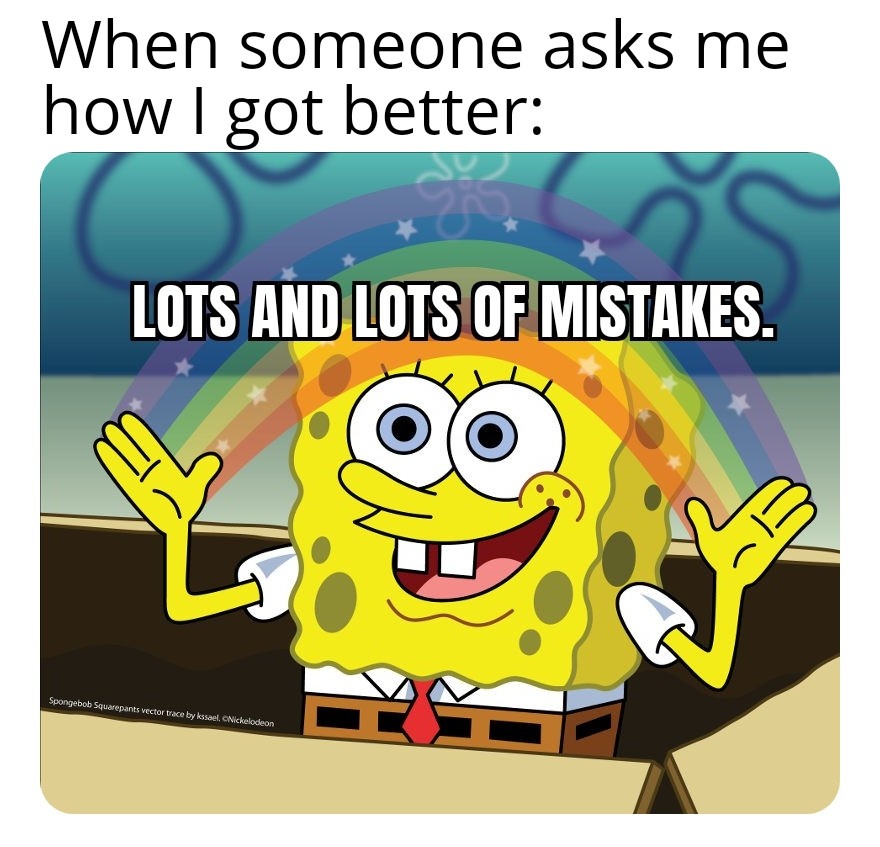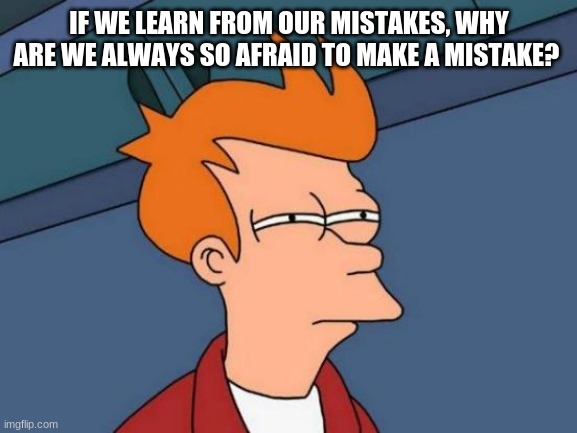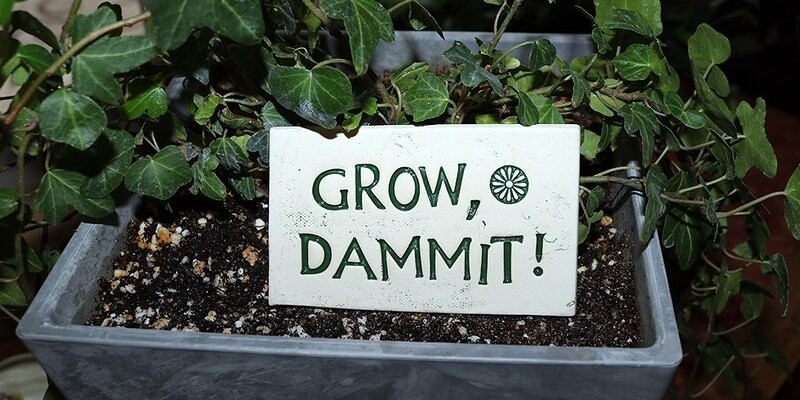No one likes to make a mistake and fail. Mistakes are connected with one of the worst feelings that a person can experience: guilt, shame, disappointment, sadness, sometimes anger. And the consequence is often an impression that we failed again, that we are not good enough to do what we are aiming to do, or that maybe we should stay where we are. We often think that what we do is pointless, we aren’t meant for more than we have today, we are incompetent, not skilled, strong or smart enough.
The truth is that if we don’t fail, it means that we don’t try hard enough. If you don’t make mistakes, it means that you stay in your comfort zone and you don’t push yourself to be in the stretch zone. Mistakes are necessary to grow. Of course they only make sense when we learn from them. When we analyze, make conclusions and move forward being wiser, with better understanding of ourselves, others and the reality that is around.
But for many of us, making a mistake, being wrong or making a bad decision is a no-go. The end of the trip, relation or a business opportunity. So the question is: what we can do differently to use the mistakes to grow, instead of being eaten by them alive? Let’s dig deeper into that today.
1. Treat a day without a mistake as a bad day
Sara Blakely, who is a founder of Spanx (a brand which sells undergarments, leggings, swimwear and maternity wear in over 50 countries all over the world) was raised with quite a counterintuitive sentence that her father asked her every day. “What you failed at today?”, was this sentence. And when she answered: “nothing, everything was fine”, her father was saying something like: “that means that you didn’t try hard enough”. And that’s how she and her brother learned that they need to have at least one failure or mistake every single day when they come back home from school, because without that, the day is not valuable. It was an actual failure not to fail.
Of course it is not only about failing every day and be miserable because of it. The main thing is to fail and learn from every single thing that went wrong. To make mistakes, to reflect and be better the next day.
Look how this shift of thinking can free you up from the guilt, being constantly unsatisfied or feeling that you are not good enough. This shift allows you to make a change in your mindset that will have a huge influence on what you do, how you think and make decisions. From now on, every day (at the end of the day or the next day in the morning: if you journal, it’s a great thing to add to your journaling ritual) think about one situation, reaction, decision, or thing you did the day before that you are not proud of. Or you treat it like a mistake, failure, not the best version of yourself. Think about what triggered you to behave that way and ask yourself: what could I’ve done differently in that situation? What other, better decision could I’ve make?

Treat a day without a mistake as a bad day, look for those moments that weren’t perfect, reflect and learn from them. But protect yourself from going too far into the rabbit hole of disappointment or guilt: it won’t bring you any good. Be smart about it: when you feel that you don’t feel very well, stop for a few days, get some rest. That’s fine to take a breath from time to time. For some of us that kind of exercise can be really hard, even exhausting. Especially if you have a “Be Perfect” Driver that tells you that when you not 100%, you are not a valuable person. Be aware of it, look for the roots and change your story. This is something you actually can do for yourself.
2. Get one thing for you from every mistake
To use every mistake as an opportunity to grow, to build a momentum, we need to be wise about the work that we do within each situation. It is a really thin line between a constructive analysis of the situation and sinking into the abyss of despair, imperfection or disappointment of who we are in compare to who we think we should be.
That’s why I would like to invite you to get only one thing from every mistake you make for yourself. Not more, not less. It’s a good and healthy way to protect yourself (especially from the mental health perspective), to not go to deep into the negative emotions. For some of us, it can be tempting to go to far and land in this moment that it’s going to be super hard to get out of.
You said something mean to your significant other? Think about why you did that and give yourself one sentence that can be more adequate for you to use the next time when a similar situation appears. Don’t ask yourself the questions like: “does he/she love me at all?”, “am I smart/funny/pretty/handsome enough?” or “where are we going?”. Of course, some of those questions can be valid, but for this exercise reflect on just one thing you can do differently, so you see the results in your area of influence.
Somebody at work pushed you to the limits of your patience by their incompetence? You can ask yourself: “are they really incompetent? Maybe their competence lays somewhere else that in my reference frame?”. And one of the most important: “what have I done to come back to OK-OK position with them?”. This is the question that resonates with me lately, and I think that it may be useful for you as well. What one thing can you do differently tomorrow in relation to that person?
3. Invest 5 minutes of growth every time
Every time you see an opportunity to do something better, use 5 minutes to learn how to do it differently. Treat it as a concrete growth time, even if you know (from the rational perspective) what to do and how. There is always a space to grow, try something new.
You snapped at your significant other, because you were tired after the hard day at work? Read a 5-minute article about how to focus on communicating more adequately while being under stress (feeling tired is a body under stress as well).
You procrastinated a task and you regret it now? Watch a 5-minute video on how to procrastinate less in your life.
You made a wrong decision? Call or write to a person that you know that deals really good while making decisions. Ask for 3 things that supports them in this area.
Small, meaningful, targeted actions. Including others, or not. Reading, listening, discussing, experiencing, knowledge sharing. Pick your medium, the way that you learn the best and use it for your own good.
4. Build a winning mindset
Winning mindset is a framework of thinking and reflecting on ourselves and reality that is around us that allows us to succeed. Regardless of what success means to you, the winning mindset is a base of everything you do, every decision you make on where you spend your time and energy to get the best possible results.
Using every mistake as a fuel that drives us to move forward is one of the best possible ways to feed this mindset, to make it better and stronger. The convictions and beliefs that we have in our brains about us and the world are strong, most of them were made before the age of 6. Many of those thoughts are telling us what we should or shouldn’t do, be, how to act, what kind of roles in the society we should have. Somewhere in between of all of them, there is a conviction about making mistakes.
What is your belief about making a mistake? Is it a sign of weakness, a reason to be ashamed of? Does making mistakes mean that you are not perfect, so you shouldn’t be loved or seen as a valuable person? Or maybe every mistake is a chance to do something better, to learn from it? That it is fine to make them because only then we know how to grow?

The first set of convictions is connected to the losing mindset. These are limited beliefs that won’t bring you anything good and will possibly drag you down. The second set of convictions is a winning mindset itself. It allows to stay in the OK-OK position that will empower you, bring you more chances to have a positive outcome of what you do. Creating this in your brain can be hard, especially when you were fed my people who raised you with all of those: “you need to be perfect to be valuable”, or “You got B+? Why not A?!” sentences. But it’s possible to transform those thoughts into more fruitful, caring, open thoughts and beliefs that will actually be a game changer for you. Think about what kind of thoughts you want to have more of in your brain, write them down and put in some place where you can look at it every day. It’ll help you in recreating your mindset to be a winning one.
5. Move on
Staying too long in the state where you analyze the same situation over and over again is not going to help you to grow. The amount of energy, time, focus and emotions that you invest in a certain history needs to be adequate. When you overspend your resources on one story, you risk feeling worse than before, you can lose your confidence and your momentum. And the result can be the opposite to what you’ve intended: you will feel demotivated and you will beat yourself up for not being as good as you wanted.
So be smart about it, make a structure around the analysis. Ask yourself: what happened? Why? Where it was my responsibility and where it wasn’t? What I’ve could done differently? What I can do differently the next time? What one thing I can learn from this?
Answer the ones that resonates with you, make a former decision and move on. No one feels good about themselves and is effective or efficient while being in the stretch zone for too long. We need to move between a comfort and stretch zone to get the best results: being too long in either of them can do more harm than good. By feeling like that it’s more possible that you’ll quit before actually making a change in your life.
Use every mistake you make and be better, smarter, wiser, more mindful about what you do. This knowledge and awareness will keep your momentum going, and will allow you to be great in whatever you decide to do.
So, what kind of mistake did you make today and how you are going to use it to grow?




